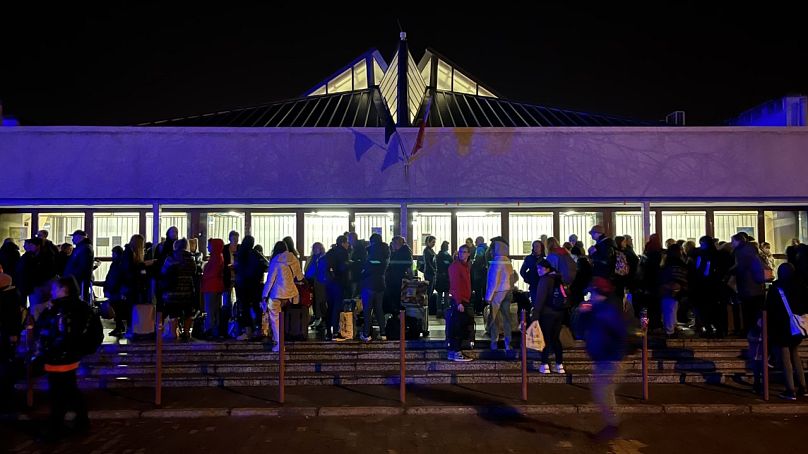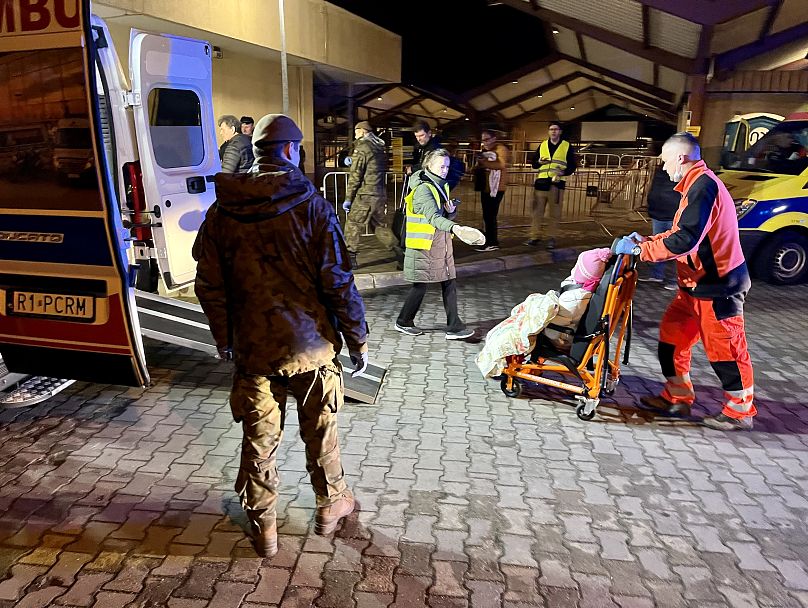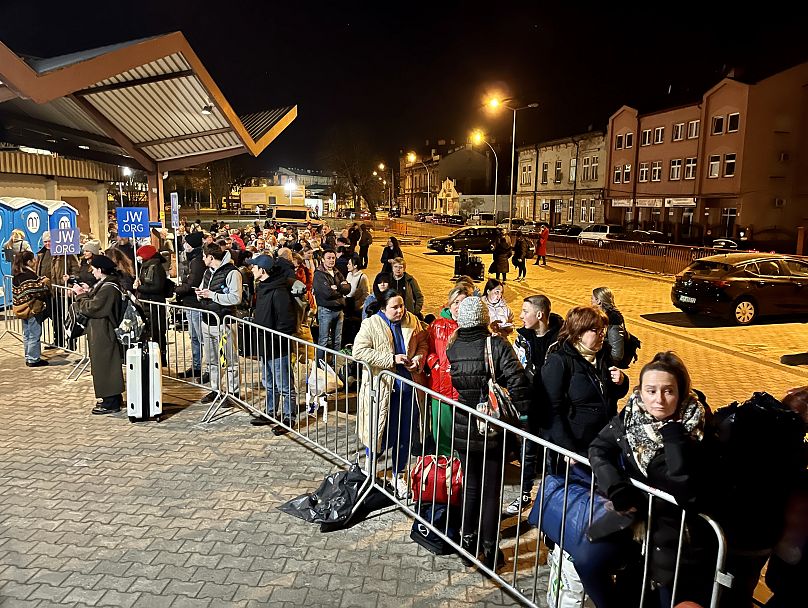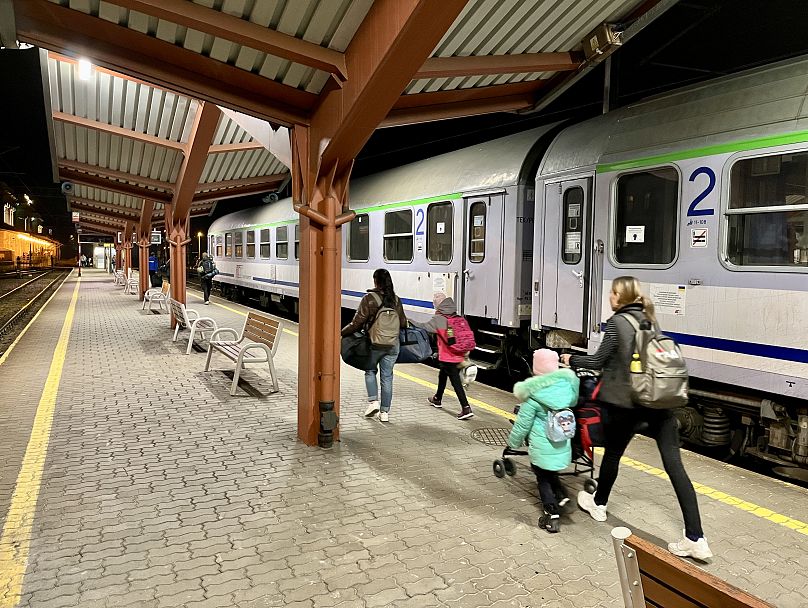Going home to war: Why are more Ukrainian refugees now turning back from Poland?
More than 3.9 million Ukrainians have fled since Russia's invasion. But at the Poland-Ukraine border town of Przemyśl, more are now heading back than leaving.
As the war enters its sixth week, the number of Ukrainians who have decided against taking up residence in the European Union is on the rise.
Hundreds of Ukrainians, almost entirely women, children and the elderly, stood in the line for the Kyiv-bound night train in Przemyśl, the main refugee hub in south-eastern Poland, on Monday night.
Among them was Natalia, 46, wrapped in a thick coat and scarf, waiting in line for the first leg of her trip to Zaporizhzhia after leaving her 16-year-old son in the Polish city of Katowice.
“The main thing was to get my child out,” she told Euronews. “I managed to remove my son from a hotspot. I brought him, I left him to live here until the war ends and I’m returning to my husband and my mother.”
Zaporizhzhia, a city in south-eastern Ukraine, has been subject to ongoing attacks and indiscriminate shelling by Russian forces since the beginning of the invasion.
It is also home to the largest nuclear power plant in Europe, whose shelling in early March and the eruption of a fire sparked concerns that a potential breach of its reactors and the resulting meltdown could cause a massive disaster — the first of its kind since the 1986 calamity at Chernobyl.
More than 3.9 million Ukrainians fled their country since Russia attacked more than a month ago, the majority heading for Poland.
But for Natalia, a recent lull in fighting opened up the possibility of return, as the alternative of staying abroad became increasingly untenable. She said many of her compatriots feel the same thing.
“Many are returning because they couldn’t find accommodation, they couldn’t find work — there wasn’t a possibility to live here. We’re not rich, and we weren’t aiming to come here for a holiday.”
“At home at least we can live off of our own resources. Home is home,” Natalia emphasised.
Concern for family members outweighs the fear of war
Others at the station said that one of the reasons for their return home was also a mixture of concern for family members and a lack of security in their places of refuge.
Yuri, a 71-year-old law professor, said he was returning to Kyiv because of his elderly mother who was on her own in the capital.
“It’s a problem I need to solve. But I also have my friends there, my books, my computer. I feel more settled there.”
But not everyone is returning permanently. Some are only on their way to get others — be it family members or pets — so that they can take them to safety.
Marina, 34, was going to Lviv to meet with her parents to get her 13-year-old daughter and bring her to the Netherlands.
She waited with hundreds of others on Tuesday night as the rain started to drizzle amid information from volunteers that the Kyiv train was delayed by almost three hours.
Those gathered on the platform patiently waited as more than a dozen children were carried out on stretchers and taken away by ambulance vehicles.
“I’m a little scared, but I saw that a lot of people are coming back in general and I was happy to see that people are not afraid. People are going to places that are even less safe than Lviv or Poltava. And that gave me courage,” she told Euronews.
'The waves are meeting in the middle'
Maciek from Szczecin has been volunteering for JDC, a leading Jewish relief organisation, since the beginning of the war.
He took a break for several days before returning to Przemyśl on Sunday, and he said he was surprised that the number of people coming in from Ukraine significantly subsided.
At the same time, the number of people returning to their homes has increased to the point where he and other volunteers believe that almost as many people are now returning as escaping the war — at least when it comes to those travelling through the Przemyśl train station.
“Two weeks ago when I was here, it was a big mess. But now the wave is a lot smaller, and you can especially notice that a lot of people are going back. A lot of them are making this decision.”
“So the waves are evening out and meeting in the middle. I feel a lot fewer people are escaping,” he told Euronews.
Polish Border Police stated that according to its data, some 21,000 Ukrainians entered the country, while about 12,000 left on Monday. A total of 364,000 people have returned to Ukraine since 24 February.
Poland has been the largest single destination for refugees fleeing Ukraine, with about 2.3 million people thought to be hosted there, according to UN figures.
And for some Ukrainians, life in Poland has proven to be challenging, and their situation became desperate due to a lack of resources, Maciek said.
Many refugees in Poland had to rely on the kindness of the ordinary people, as countries across Europe struggled with a unified, planned approach to everything from documenting those seeking help to providing them with basic sustenance fees — a bit of money that would cover for their basic expenses.
The job market and higher education remain difficult to access for many.
Earlier in March, UN officials warned that up to 90% of Ukrainians were facing poverty and extreme economic vulnerability, setting the country back decades, and leaving deep economic scars. Refugees are particularly at this risk.
A number of humanitarian and human rights organisations have also raised concerns over the safety of those coming in from Ukraine, including possible human trafficking violations.
But the biggest problem is the lack of capacity, with some of those returning saying that they have spent weeks on end sleeping in sports halls and gymnasiums in remote parts of the country, unsure whether they will be able to find a better arrangement for them and their family members if they waited a little longer.
“People are going back because of the reality here. We are full. I’m from northwestern Poland, near the border with Germany. And even there, there are a lot of refugees in need of help,” Maciek said.
“If you can say to the world, everything that is good here is mostly because of the people in Poland. Not the government,” he concluded.
But according to UNHCR spokesperson Rafał Kostrzyński, the Polish government was doing an extraordinary job.
“The government is doing remarkably well, considering the high number of arrivals,” he told Euronews.
“They kept the borders open, which is a very welcome approach. They opened the borders not only to Ukrainian refugees, but also third-country nationals, which is also commendable.”
“Problems exist — there are gaps, there are risks, and so on — but given the whole context, and taking into account the very complex situation, the fate of the refugees here in Poland is not that bad,” Kostrzyński said.
“They do receive assistance — not always to the extent they would like to, but they do receive help.”














